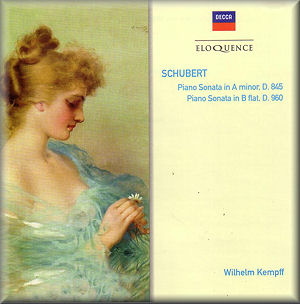 |
 |
|


CD: AmazonUK
AmazonUS
|
Franz SCHUBERT (1797-1827)
Piano Sonata No. 16 in A minor, D. 845 (1825) [34:41]
Piano Sonata No. 21 in B flat major, D. 960 (1828) [35.56]
 Wilhelm Kempff (piano)
Wilhelm Kempff (piano)
rec. Decca Studios, West Hampstead, London, November 1950 (D. 960)
and March 1953 (D. 845)
 DECCA ELOQUENCE 476 9913 [70:45]
DECCA ELOQUENCE 476 9913 [70:45] 
|
|
|
The Eloquence catalogue is an extraordinarily
rich collection of archive material, and fortunate indeed is the
person responsible for compiling it. I want that job! I reviewed
recently a disc of Arthur Grumiaux playing the Berg Violin Concerto,
and that is only one example chosen from countless indispensable
discs available at an almost laughably low price. And if not all
the issues are of such importance – how could they be? – each
one has some serious claim on the collector. Here we have Wilhelm
Kempff playing two Schubert piano sonatas in recordings originally
issued on Decca. The A minor Sonata has apparently been issued
on CD before, but this is the first appearance on CD of the B
flat major. Neither performance should be confused with the pianist’s
later recordings, a complete cycle recorded by Deutsche Grammophon.
The sound is inevitably showing its age, particularly in louder
passages where there is some distortion, harshness and congestion.
The playing completely eschews any suggestion of sensationalism.
It is sober, considered, weighty and serious. The pianist seems
to lay the music before the listener in an almost dispassionate
way, inviting us to make of it what we will. I feel this particularly
in the first movement of the A minor sonata, where the often sparse
textures, uncompromising as they are, are allowed, as it were,
to speak for themselves. Indeed, there is very little that can
be termed interventionist in these performances. Yes, he makes
a slight accelerando in the final bars of this same movement,
but that is little more than a nod in the direction of surface
drama, and the development section is almost classical in its
emotional restraint. It is more fruitful for the listener to seek
out the subtle differences in phrasing and dynamics in the repeats
of the variations in the slow movement than it is to search for
drama in the scherzo. The lilting, lulling trio is most affectingly
done, however. The extended two-part writing in the finale is
again presented to the listener unadorned, and here one might
wish for something more impetuous, more passionate, though Kempff
royally does the honours in the very final bars.
The sublime opening of the D. 960 sonata is wonderfully poised
in Kempff’s hands, which makes it all the more of a pity that
the sound is so poor here. This is due, I imagine, to deterioration
of the master tape, and it settles down after only a few bars.
All the same, there is a fair amount of background noise and print-through
from the original tapes, and fortissimo passages, particularly
the two in the finale, make for less than comfortable listening.
Kempff is quite free with pulse in the first movement, markedly
more romantic in his approach here than he was in the earlier
sonata. This is a view with which I concur in this most songlike
of sonata movements. He does not observe the exposition repeat,
which for some will be a relief – the movement is already a very
long one – but for others will be a serious drawback, bearing
in mind that this means omitting nine bars of music that Schubert
composed expressly for the purpose, and which features, incidentally,
one of the low, left-hand trills that occur throughout the movement.
The slow movement is beautifully played in Kempff’s now familiar,
rather straightforward – though far from anonymous – manner. The
scherzo, too, is similarly clear-cut, and here as elsewhere one
admires the pianist’s skill in bringing out melodic lines while
never allowing the often repetitive accompanying figuration to
sink into insignificance. Kempff launches the finale at a tempo
as rapid as one is likely to hear it nowadays, and the effect
is robust rather than playful, a perfectly valid view given the
triumphant close, though the final crescendo can hardly
be said to begin piano as the score demands.
Admirers of Wilhelm Kempff, who died only in 1991 at the age of
ninety-five, will want this issue, particularly for the otherwise
unavailable performance of the D. 960 Sonata. Schubert lovers,
too, will welcome the serenity and wisdom of Kempff’s Schubertian
vision. The pianist made a more beautiful sound than one gathers
from this disc, and those for whom this is an important consideration
will prefer to seek out one of the many more recent performances.
The historic nature of these performances makes comparative listening
irrelevant, and the quality of the readings is in any event beyond
serious criticism.
The attractiveness of this issue is enhanced, as is customary,
by a friendly, readable and informative booklet note by Jed Distler.
William Hedley
|
|












